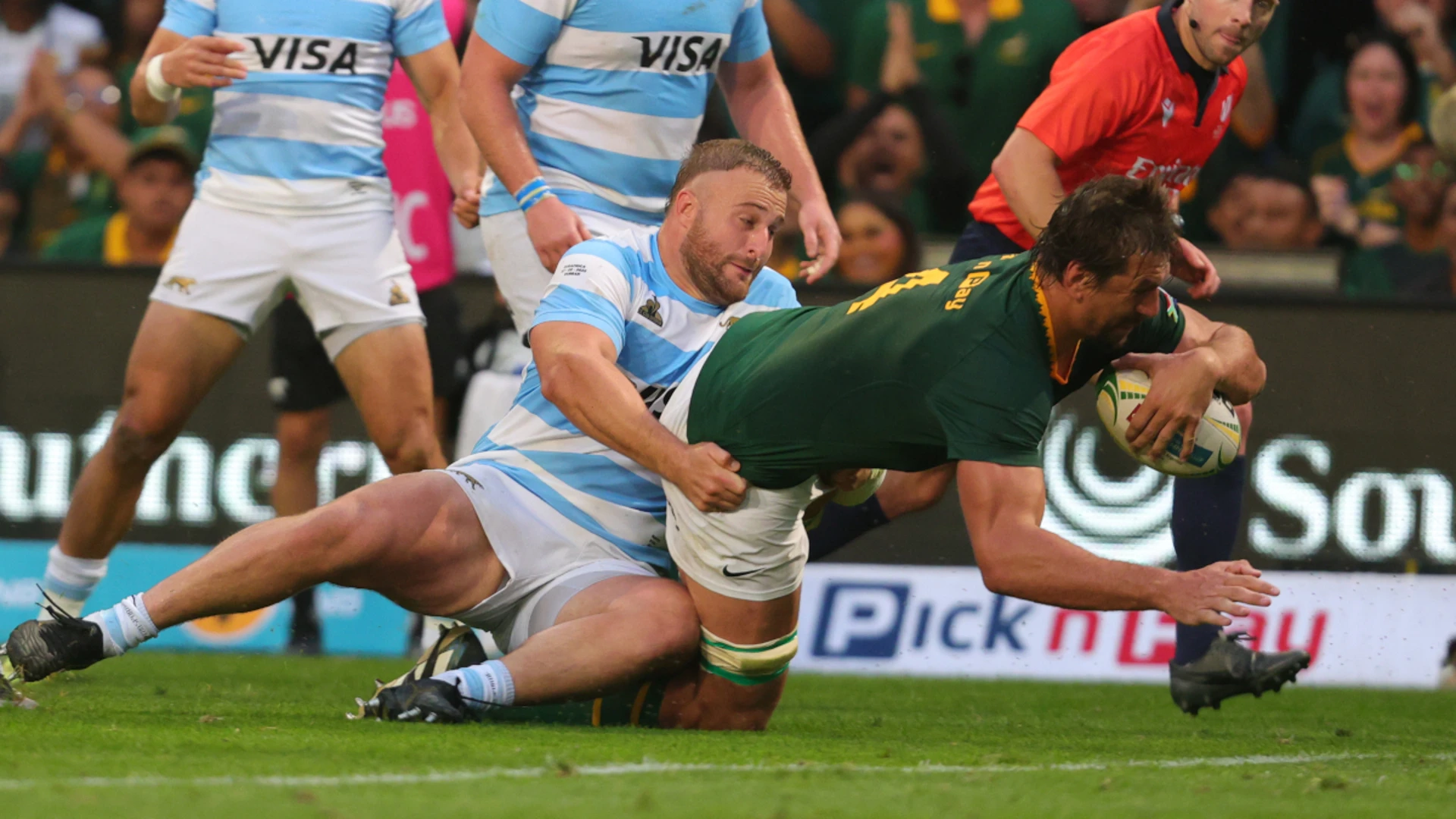Etzebeth's try should have been given - Tappe

Eben Etzebeth’s try against Argentina should have stood - but it is a lot more complicated than that.
That’s the view of United Rugby Championship referee boss Tappe Henning, who was asked about the controversial disallowed try in this past weekend’s Castle Lager Rugby Championship win over Argentina.
Advertisement
The try - which was disallowed after an Argentinian player kicked the ball out of Cobus Reinach’s hands and was adjudged illegal, but also a knock on, perplexed many as it seemed as if a cynical act shouldn’t have been rewarded like that.
The problem, it seems, is that an incident like that hasn’t happened before and the two laws governing it have never had to be judged together. World Rugby is currently coming up with a law clarification, but Henning, who manages the referees in URC, believes the try should have stood.
While the unprecedented incident is not a slight on referee Angus Gardner, who used the law as best he understood it, Henning believes the clarification that will come will sort a lot of things out.
NEVER SEEN BEFORE
“I've not seen this before. And the game is, that's what our game is all about. The laws try to cover most incidents, whether it's legal, whether it's not,” Henning said.
“In this case, you're right, there's two laws that need to be considered. The first one is the illegal act of kicking the ball from a player's possession. You're not allowed to do that. That's foul play and it is a penalty.
"The second part of that incident is what happens to the ball after the Argentinian player dislodge the ball from the hands of Cobus Reinach. And that's the second part of the law, where the ball did go forward from his hand.
“And the question that we now have and what we ask ourselves is, do we play advantage? Is that a knock on because it was illegally dislodged by a kick after he's lifted the ball and he's clearly in position? Or is that a first infringement - the kick of the ball out of the hand and the second infringement is a knock on, so we cannot play on.
“We will have to go back to the first infringement. And that was the process and the decision of the referee on the day as I followed it and as it was explained. Yes, it is illegal to kick the ball.
SAME AS A RIPPED BALL
“Secondly, yes, it is a knock on if the ball goes out of the hand forward. The law makes provision for a circumstance where a position player rips the ball from the position of a player that's carrying the ball. And if the ball then goes from that player that's carrying the ball, if the ball goes forward when it's ripped by a position player, it's not deemed to be a knock on or lose of position forward.
“Play continues and the law is very specific around that. Now, if that's the intention of the law, when the ball is ripped from the position from someone, I would be amazed and I would go down the route of the similar principle that should apply when a player kicks the ball from the position of a player who's carrying the ball. If that same principle applies, it should not be a knock on.
“An advantage should apply. And in that case, they did play on. Yes, the green team played and the Springboks played and Etzebeth was over the line and scoring on the try, so the try should stand.”
ISN’T COVERED IN LAW
Henning said the problem is - as often happens in rugby - the incident isn’t covered in law or rulings yet.
“As we sit at the moment, unfortunately, that incident specifically is not covered in law or in rulings or clarifications as it stands.
“My thinking around this situation with Cobus is that if that's the principle and the intention of that law of ripping the ball, that player is not responsible for losing the ball. It was ripped by an opposition player. The same principle just makes sense if we apply it in that scenario as well, although currently the law doesn't give us that option.
“So on Saturday, what I observed with the referee made the decision, they went through both laws and as it stands at the moment, because there's no specific law about when the ball is kicked out of the hand and it goes forward, that it's a knock on or not a knock on. They applied the laws as it stands currently.
“So where do I go as a URC head of match officials? What do I tell my referees if that happens on Saturday? I would go down the route to say that, guys, the ball has been dislodged with a kick, which is not a knock on or loss of position by the player, but it's been dislodged by a kick.
ADVANTAGE SHOULD BE PLAYED
“If the opportunity is there to play advantage, play advantage or come back. And if there's no advantage, then come back and deal with a failed play where the ball was kicked out of position. If that's the interpretation and if that's acceptable, we will find out from World Rugby through a ruling or a clarification.
“But we cannot fault match officials for the process that they went through. It's not possible to write the law book that will cover all scenarios in a game. And then sometimes you need to apply what the intention of the law is, what the principle of the law is.
“But then we also need to get it with World Rugby if there's agreement on that interpretation and application. And that's where we are with this case.”
Advertisement

